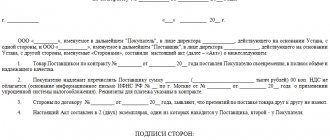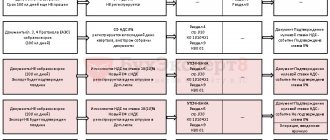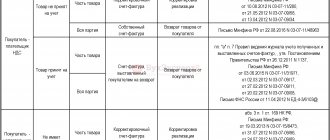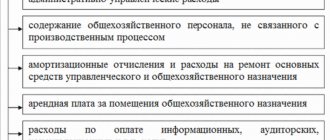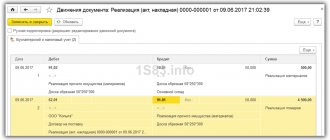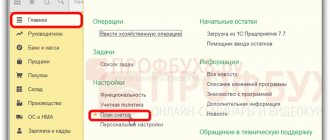Let's consider situations where your own products or purchased goods have expired. When reflecting the specified products (goods) in accounting, the following options are possible:
- the production organization writes off (disposes) its own products, which were “stayed” in the warehouse and could not be sold before the expiration date;
- the production organization sent expired products for processing;
- the manufacturing organization buys expired goods from its customers and then destroys (recycles) them;
- the trading organization was unable to sell previously purchased goods and disposes of it with the help of a specialized company;
- The trade organization returns expired goods to the manufacturer.
We present the procedure for accounting and tax accounting of products (goods) in all of the above situations.
During the inventory, the write-off of damaged goods is documented in an act, for example, in the TORG-15 or TORG-16 forms.
Accounting
- The production organization writes off (disposes) its own products
The cost of products is written off as expenses not related to its production - other expenses (clause 11 of PBU 10/99 “Organizational expenses”).
The cost of work on the destruction of raw materials performed by a specialized organization is also included in other expenses (clauses 4, 11 of PBU 10/99). The corresponding entries are given in table. 1.
| Table 1. Accounting for write-off (disposal) of own products | ||
| Debit | Credit | Contents of operations |
| 94 | 43 | The cost of spoiled products has been written off |
| 91–2 | 94 | The cost of losses is included in other expenses |
| 91–2 | 70, 69, 60 | Disposal (destruction) costs are reflected |
- The production organization sent its own expired products for processing
When expired perishable products are found in the manufacturer's warehouse and sent to them for processing for use as secondary raw materials, such products are transferred from finished products to the category of inventories (MPI). The correspondence of accounts will look like this (Table 2).
| Table 2. Accounting for the processing of expired products for use as secondary raw materials | ||
| Debit | Credit | Contents of operations |
| 20 | 43, 70, 69 | The costs of processing expired products are reflected |
| 10 | 20 | The cost of expired products is included in the inventory (including the cost of processing such products) |
| 20 | 10 | Secondary raw materials released into production |
- The manufacturing organization buys expired goods from its customers
The accounting reflects the repurchase of products (if their sales were reflected). Then, in relation to stocks, and not spoiled products, the described procedure is applied (depending on the situation). The following entries will be made (Table 3).
| Table 3. Accounting for product repurchase from buyers | ||
| Debit | Credit | Contents of operations |
| 10 | 60 (62) | A buyback of products has been carried out that are already reflected as inventories |
| 19 | 60 (62) | The presented VAT upon reverse sale is reflected |
| 91–2 | 19 | VAT is included in other expenses |
- Expired perishable products were found in the warehouse of a trading organization and transferred by it independently for destruction (disposal)
In this case, the accounting entries in the accounting of a trade organization are similar to those of the manufacturer when he discovered expired products and destroyed them himself. The difference is that the trade organization writes off not products, but goods (Table 4).
| Table 4. Accounting for the destruction (disposal) of spoiled goods in a trade organization | ||
| Debit | Credit | Contents of operations |
| 94 | 41 | The cost of spoiled goods has been written off |
| 91–2 | 94 | The cost of losses is included in other expenses |
| 19 | 68-VAT | VAT restored |
| 91–2 | 19 | VAT is included in other expenses |
| 91–2 | 60, 69, 70 | Disposal (destruction) costs are reflected |
- The trade organization returns expired goods to the manufacturer
In the accounting of a trade organization, the return of expired goods is reflected in the following entries (Table 5).
| Table 5. Accounting in a trade organization for the return of expired goods to the manufacturer | ||
| Debit | Credit | Contents of operations |
| 76 | 41 | Products returned |
| 76 | 68-VAT | VAT restored |
| 51 | 76 | Received funds from the supplier as payment for the goods |
Tax accounting
- Corporate income tax
For purposes of calculating income tax, the procedure for writing off goods depends on the situation.
If the product (goods) has expired, then its cost is fully taken into account in other expenses (clause 49, clause 1, article 264 of the Tax Code of the Russian Federation). This position is set out in letters of the Ministry of Finance of Russia dated 06/26/13 No. 03-03-06/1/24154, dated 12/20/12 No. 03-03-06/1/711, dated 12/24/14 No. 03- 03-06/1/66948), which indicate that expenses in the form of the cost of recycled consumables with expired expiration dates, as well as expenses for the disposal of such materials, are taken into account for the purposes of calculating income tax, provided they meet the criteria established in paragraph. 1 tbsp. 252 of the Tax Code of the Russian Federation. For example, the costs of disposal or destruction of the specified products can be taken into account as expenses for profit tax purposes in accordance with the provisions of paragraphs. 49 clause 1 art. 264 N.
How is the procedure done?
At the legislative level, there are no step-by-step instructions for writing off expired products. For this reason, organizations develop local regulations.
They are formalized in the form of instructions or regulations, and approved by orders of managers. All employees who will be involved in a procedure of this nature must be familiar with the contents of the local regulatory act against signature.
Example entries for writing off expired materials and finished products:
- General provisions. This section specifies the scope of the instructions, the basis for the write-off procedure, and the criteria for expired products.
- General write-off rules. The frequency of checks and the algorithm of actions are indicated here.
- Procedure for the formation of the commission. It determines who is included, the number of members, and their powers.
This structure is optional. An organization may name sections differently. The procedure itself consists of the following steps :
- Issuance of an order to conduct an inspection. It can be planned or sudden. The decision is made by the head of the organization. The composition of the commission is formed by order.
- Implementation of necessary activities. Members of the commission compare product labeling with data from accounting documents and check the actual condition of products.
- Drawing up an order and act of writing off expired products.
The procedure ends with the transfer of products for destruction or disposal.
VAT recovery
- Value added tax
There is no need to restore VAT on goods (products) that are withdrawn from circulation due to their expiration date.
However, the position of the Russian Ministry of Finance is somewhat different: the possibility of deducting VAT depends on the reason for writing off the goods. VAT previously accepted for deduction does not need to be restored if the purpose of the write-off and destruction of substandard products is to ensure the safety of production and subsequent sale of good-quality products or the write-off and destruction of substandard products is carried out by decision of the authorities (letter dated August 23, 2013 No. 03-07-11 /34617).
Amounts of VAT previously accepted for deduction on goods (products) that are written off due to the expiration date are subject to restoration (letter of the Ministry of Finance of Russia dated December 8, 2015 No. 03-03-06/1/71647, dated July 5, 2011 No. 03-03-06/1/397, dated July 4, 11, No. 03-03-06/1/387, dated June 7, 11, No. 03-03-06/1/332, etc.).
The tax is restored in the tax period in which the expired product is deregistered.
Meanwhile, the courts do not agree with this position.
Thus, in the decision of the Supreme Arbitration Court of the Russian Federation dated May 19, 2011 No. 3943/11 it is stated that in paragraph 3 of Art. 170 of the Tax Code of the Russian Federation provides for cases when tax amounts accepted for deduction by the taxpayer on goods (work, services), including fixed assets and intangible assets, property rights, are subject to restoration. However, writing off goods with expired shelf life (sales) does not apply to the cases listed in the said tax norm.
A similar position is set out in the resolutions of the FAS Volga District dated November 9, 12, No. F06-8238/12, the FAS Volgovyatsky District dated September 9, 11, No. A17-5842/2010, and the Moscow District FAS dated July 15, 2014, No. F05. -7043/14, dated 10/4/13, No. A40-149597/12, dated 01/31/13, No. A41-19560/12.
Thus, the following conclusions can be drawn: the organization may have disputes with the tax authorities if VAT is not restored when writing off expired goods; however, taking into account numerous positive judicial practices, there is a high probability of defending your position in court.
If the organization decides to restore the amount of “input” VAT, then this operation can be reflected in the debit of account 19 “Value added tax on acquired assets” and the credit of account 68 “Calculations for taxes and fees”.
The recovered VAT is written off from account 19 to the debit of account 91–2, forming the total amount of losses.
Regulatory regulation of product quality
Regulations relating to product quality include:
- Law of the Russian Federation of February 7, 1992 No. 2300-1 “On the protection of consumer rights.”
- Federal Law of January 2, 2000 No. 29-FZ “On the quality and safety of food products.”
- Decree of the Government of the Russian Federation of September 29, 1997 No. 1263 “On approval of the Regulations on the examination of low-quality and dangerous food raw materials and food products, their use or destruction.”
- Resolution of the State Statistics Committee of the Russian Federation dated December 25, 1998 No. 132 “On approval of unified forms of primary accounting documentation for accounting transactions in public catering.” It should be noted that from January 1, 2013, this regulatory act is of a recommendatory nature.
Based on these acts of legislation, organizations can adopt local norms regulating the procedure itself, taking into account the specifics of their activities.
VAT accrual when writing off expired products (goods)
Previously, the Ministry of Finance of Russia has repeatedly drawn attention to the fact that the disposal (write-off) of property due to damage, battle, theft, natural disaster and other events beyond the will of the taxpayer is not subject to VAT (letters dated April 16, 2014, No. 03 -07-08/17292, dated July 5, 2011, No. 03-03-06/1/397).
A similar point of view is set out in the Resolution of the Plenum of the Supreme Arbitration Court of the Russian Federation dated May 30, 2014 No. 33. It was noted that in such situations the taxpayer must record and document the fact of disposal of property and the fact that it was not transferred to third parties, but disposed of circumstances beyond the control of the taxpayer (the need to submit documents confirming loss, damage or theft of property to the tax authority was also indicated in the Decree of the Constitutional Court of the Russian Federation dated April 4, 2013 No. 506-O.)
Otherwise, the tax on this transaction will be calculated according to the rules of paragraph 2 of Art. 154 of the Tax Code of the Russian Federation, established for operations involving the gratuitous sale of property.
In the situation under consideration, the property is disposed of due to events beyond the will of the taxpayer (the expiration date has expired, the consumer properties of the goods have been lost), without transferring it to third parties, therefore there is no obligation to charge VAT.
- Application of PBU 18/02
Based on clause 11 of PBU 10/99, the amount of VAT not accepted for deduction in accounting relates to other expenses of the organization, and is not taken into account for tax purposes (clause 1 of Article 170, clause 49 of Article 270 of the Tax Code of the Russian Federation). In this regard, a permanent difference and a corresponding permanent tax liability (PNO) arise in accounting (clauses 4, 7 of the Accounting Regulations “Accounting for calculations of corporate income tax” (PBU 18/02), approved by order of the Ministry of Finance of Russia dated November 19 .02 No. 114n). Example 1
During the inventory, products with an expired shelf life were identified, the cost of which was 50,000 rubles. VAT on raw materials used for the production of these products in the amount of 5,000 rubles. was accepted for deduction at the time the raw materials were accepted for accounting. The cost of work on the destruction of the specified raw materials, carried out by a specialized organization, is 5900 rubles, including VAT - 900 rubles.
In the accounting of a production organization, the costs of destroying food raw materials (intended for the manufacture of food products) with an expired shelf life, identified during the inventory, will be reflected as follows (Table 6).
| Table 6. Accounting in a production organization for the costs of destroying expired food raw materials identified during the inventory | ||||
| Debit | Credit | Amount, rub. | Contents of operations | Primary document |
| 94 | 43 | 50 000 | The cost of expired products has been written off | Comparison sheet of inventory inventory results |
| 19 | 68-VAT | 5000 | VAT on expired raw materials has been restored | Accounting information |
| 94 | 19 | 5000 | Recovered VAT included in losses | Accounting information |
| 91–2 | 94 | 55 000 | The cost of losses is included in other expenses (RUB 50,000 + RUB 5,000) | Accounting information |
| 91–2 | 60 | 5900 | The cost of work on the destruction of expired raw materials is reflected | Acceptance certificate for completed work |
| 99 | 68-PNO | 1180 | PNO reflected (RUB 5,000 + RUB 900) x 20%) | Accounting certificate-calculation |
| 60 | 51 | 5900 | Paid for the destruction of raw materials | Bank account statement |
Example 2
Under a supply agreement, an organization purchased goods worth RUB 472,000. (including VAT - 72,000 rubles) and paid for it. The organization does not bear any other costs associated with the purchase of goods. The goods were not sold and their expiration date has expired. The product has been returned to the supplier. For the purposes of calculating income tax, income and expenses are determined using the accrual method.
In the accounting of a trade organization, the return of expired goods to the supplier must be reflected as follows (Table 7).
| Table 7. Accounting in a trade organization for the return of expired goods to the supplier | ||||
| Debit | Credit | Amount, rub. | Contents of operations | Primary document |
| Upon receipt of the goods | ||||
| 41 | 60 | 400 000 | Goods received (RUB 472,000 - RUB 72,000) | Supplier shipping documents, goods acceptance certificate |
| 19 | 60 | 72 000 | VAT presented by the supplier of the goods is reflected | Invoice |
| 68 | 19 | 72 000 | Accepted for deduction of VAT presented by the supplier of the goods | Invoice |
| 60 | 51 | 472 000 | Funds were transferred to the supplier of the goods | Bank account statement |
| When returning an expired product | ||||
| 76–2 | 41 | 400 000 | Product returned to supplier | Letter of claim, documents for returning goods |
| 76–2 | 68-VAT | 72 000 | VAT charged | Invoice |
| 51 | 76–2 | 472 000 | Received funds from the supplier | Bank account statement |
Buyback of expired products
Many suppliers cooperating with retail chains undertake obligations to buy back the supplied products if they are not sold online before the expiration date. Therefore, the supplier bears the costs of repurchasing expired goods and their further write-off (destruction, disposal). In this situation, the following questions arise: what should the seller do with VAT when buying back expired products from the buyer; Is it possible to take into account the cost of expired products and the costs of their disposal when taxing profits; What documents should be used to confirm the write-off of expired goods?
- Accounting
Revenue from the sale of products is recognized by the organization as income from ordinary activities on the date of transfer of ownership of these products to the buyer - a retail chain (on the date of sale);
in this case, an entry is made: debit account 62 “Settlements with buyers and customers”, credit account 90 “Sales”, subaccount 1 “Revenue”. At the same time, the debit of account 90, subaccount 2 “Cost of sales”, from account 43 “Finished products” the accounting value (actual cost) of products is written off (clauses 5, 12 of the Accounting Regulations “Organizational Income” (PBU 9/99), approved by order of the Ministry of Finance of Russia dated May 6, 1999 No. 32n, paragraphs 5, 9, paragraph 2 of clause 19 of the Accounting Regulations “Organization Expenses” (PBU 10/99), approved by order of the Ministry of Finance of Russia dated May 6, 1999 No. 33n , Instructions for the application of the Chart of Accounts for accounting the financial and economic activities of organizations, approved by Order of the Ministry of Finance of Russia dated October 31, 2000 No. 94n). It is obvious that purchased products intended for disposal can no longer be used in future production and sales.
Consequently, the costs of the repurchase are other, to be reflected in the debit of account 91 “Other income and expenses”, subaccount 2 “Other expenses”, in correspondence with account 60 “Settlements with suppliers and contractors” as of the date of the repurchase (clause 11, 15, 16 PBU 10/99).
- Value added tax
Sales of products are recognized as subject to VAT (clause 1, clause 1, article 146 of the Tax Code of the Russian Federation).
When shipping products from the sales price (excluding VAT), the organization charges VAT for payment to the budget at a rate of 18% (clause 1 of Article 154, clause 3 of Article 164 of the Tax Code of the Russian Federation). The retail chain imposes VAT on the organization at a rate of 18%.
The Ministry of Finance of Russia in a letter dated September 14, 2010 No. 03-03-06/1/587 with reference to clause 2 of Art. 172 of the Tax Code of the Russian Federation indicated that it is impossible to deduct VAT claimed when purchasing confectionery products with an expired shelf life, since the organization is purchasing these products not for subsequent sale (i.e., for carrying out transactions subject to VAT), but for destruction.
In a letter dated July 4, 2011 No. 03-03-06/1/387, the Ministry of Finance of Russia recalled that VAT amounts presented to the taxpayer when purchasing goods, works or services in the territory of the Russian Federation used to carry out transactions that are recognized as objects of taxation are subject to deductions. this tax (clause 1, clause 2, article 171 of the Tax Code of the Russian Federation). At the same time, the disposal of goods due to the expiration of the shelf life (i.e. for a reason not related to sale or gratuitous transfer) is not subject to VAT (Articles 39 and 146 of the Tax Code of the Russian Federation). Thus, the amounts of VAT that the organization previously accepted for deduction on goods written off due to expiration will have to be restored.
The Ministry of Finance of Russia expressed a similar opinion in letter dated July 5, 2011 No. 03-03-06/1/397.
Based on the foregoing, we can draw the following conclusion: since when repurchasing products with an expired shelf life, they are subject to disposal, it is obvious that these products will not be used in activities subject to VAT, therefore, there is no basis for deducting the VAT claimed by the retail chain, since one of the conditions for its application is not met (clause 1, clause 2, article 171, clause 1, article 172 of the Tax Code of the Russian Federation, letter of the Ministry of Finance of Russia No. 03-03-06/1/587).
In accounting, the amount of VAT not accepted for deduction on the basis of clause 11 of PBU 10/99 relates to other expenses of the organization, and is not taken into account for tax purposes (clause 1 of Article 170, clause 49 of Article 270 of the Tax Code of the Russian Federation).
- Income tax
Costs for the destruction of expired products can be taken into account as part of other tax expenses associated with production and sales (clause 49, paragraph 1, article 264 of the Tax Code of the Russian Federation), subject to the main condition that such expenses were incurred within the framework of business activity and are documented (Clause 1 of Article 252 of the Tax Code of the Russian Federation, letter of the Ministry of Finance of Russia dated December 24, 2014 No. 03-03-06/1/66948).
The letter of the Ministry of Finance of Russia dated May 29, 2015 No. 03-03-06/1/31132 states that expenses associated with the repurchase of expired products can be taken into account for tax purposes if an agreement is concluded for the repurchase of expired products from a trading organization suitability. These expenses, as well as the costs of disposal of such products, may reduce the tax base for income tax based on paragraphs. 49 clause 1 art. 264 of the Tax Code of the Russian Federation, provided that these expenses were incurred as part of business activities and are properly documented.
- Application of PBU 18/02
When repurchasing products with an expired shelf life, VAT not accepted for deduction is included in other expenses, but is not taken into account when calculating income tax. In this regard, a permanent difference and a corresponding permanent tax liability (PNO) arise in the organization’s accounting (clauses 4, 7 of PBU 18/02). Example 3
An organization producing perishable food products supplied it to a retail chain in the amount of 29,500 rubles. (including VAT - 4500 rubles). According to the supply agreement, unsold products with an expired shelf life must be returned at a cost corresponding to the cost of selling these products. After the buyback, these products must be disposed of by the manufacturer. The actual cost of the finished product is 20,000 rubles, which corresponds to the amount of direct costs for its production in tax accounting. After the expiration date, the organization purchased back and paid for its products in the amount of 590 rubles. (including VAT - 90 rubles).
The following entries will be made in the accounting records of the buyback manufacturer for the purpose of recycling perishable products after their expiration date (Table 8).
| Table 8. Accounting in the manufacturing organization for the buyback of expired products for the purpose of disposal | ||||
| Debit | Credit | Amount, rub. | Contents of operations | Primary document |
| 62 | 90–1 | 29 500 | Sales revenue recognized | Supply contract, invoice for product release |
| 90–3 | 68 | 4500 | VAT was charged on the sale of finished products (RUB 29,500 / 118 × 18%) | Invoice |
| 90–2 | 43 | 20 000 | The actual cost of products sold is written off | Accounting certificate-calculation |
| 51 | 62 | 29 500 | Funds received from buyer | Bank account statement |
| 91–2 | 60 | 500 | The cost of products purchased back is included in other expenses | Shipping documents of the counterparty |
| 19 | 60 | 90 | VAT presented by the retail chain is reflected (RUB 500 x 18%) | Invoice |
| 60 | 51 | 590 | The retail chain paid for part of the expired products | Bank account statement |
| 91–2 | 19 | 90 | VAT presented by the retail chain is included in other expenses | Invoice, accounting certificate |
| 99 | 68 | 18 | PNO reflected (90 RUR x 20%) | Accounting certificate-calculation |
What documents need to be prepared?
In addition to the local regulations or instructions on the procedure for writing off expired products, the procedure involves the preparation of other documents. These include:
- order;
- act on writing off expired food products and more.
Each of these documents records the actions and decisions taken by officials of the organization. They are issued based on the results of the audit.
Order
The decision of the head of the organization to write off expired products is formalized in the form of an order. Such a document must contain:
- Date of issue and registration number.
- Reason for writing off products. In this case it will be the expiration date.
- The basis for this decision. This is the conclusion or act of the inspection commission.
- Deadline for completing the decision.
- Information about the responsible executor - last name, first name, patronymic, position held.
- Manager's signature.
- A note indicating that the responsible executor has familiarized himself with the contents of the order.
The document is drawn up in writing, in the amount of one copy. A copy or an extract from the order is issued for the executor or other interested parties.
Act
Based on the manager’s order, an act on the write-off of expired products is drawn up. The document has two sides, each of which must be completed. The following are indicated on the front :
- Date of acceptance of the goods.
- Grounds. It could be TN or TTN.
- Date of write-off of products.
- Causes. In this case, it will be the expiration date of the product.
The reverse side contains the following information:
- Description of the product – its name and code. All products subject to write-off are consistently reflected here, indicating the quantity and cost.
- The final price of the goods being written off.
The act is signed by the responsible executor and approved by the head of the organization. The document is drawn up in three copies - for the accounting department, the department in which the write-off was made, for the financially responsible person.

